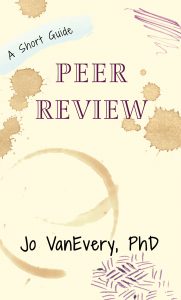
This post is an excerpt from the 4th book in my Short Guides series, Peer Review (A Short Guide), was published on 15 November 2019. I also offer a class called Dealing With Reviewer Comments which is based on the principles elaborated in this book.
The main thing I want the Short Guide, Peer Review to do is transform your view of peer review.
Too often I see people talk about peer review as a process of judgement and exclusion. As an author, this engenders fear or perhaps anger. As a reviewer you may struggle with the role of gatekeeper and it’s apparent incompatibility with kindness in your review.
This emotional landscape is further complicated by your awareness of the exploitation of your labour (as author or reviewer) by commercial publishers. In an environment with increasing pressure to publish and severe workload pressures, finding time for this essential part of the publishing process is often frustrating for both authors and reviewers.
I take the position that peer review is important to the collective project of advancing scholarly knowledge by providing editorial support to ensure the quality and clarity of contributions to scholarly conversations. Peer review is also crucial to protecting academic freedom, as freedom from commercial and political influence (within the bounds of epistemological possibility). If approached in this way, rude, dismissive, and hurtful comments are more obviously unacceptable, even when the manuscript in its current form is not ready for publication or not suitable for the particular journal or press to which it has been submitted.
Writing is a collaborative process. This is true even of sole-authored articles and books. Peer reviewers contribute to the scholarly writing process at the point where you have made your manuscript as good as it can be (usually with input from colleagues, mentors, and perhaps an editor). They bring their expertise, as contributors to the same scholarly conversation, to your manuscript and make substantive suggestions for improvement in content and clarity.
The gate-keeping function of peer review is also performed collectively and allied to this editorial function. No individual reviewer has the power to accept or reject your manuscript. Peer reviewers make recommendations to the editor(s) or editorial board about the suitability of the manuscript for publication in the specific journal or press to which it has been submitted. Their editorial comments are made in the context of their understanding of the boundaries of the conversation and the revisions that might be necessary to make it acceptable.
There is still emotional labour involved. Anger is a legitimate reaction to reviews not made in the spirit outlined here. As an author you will still feel vulnerable to judgements about whether your work belongs or is good enough. As a reviewer it is difficult to balance rigorous academic judgements with kind, constructive feedback.
It is my hope that Peer Review, a Short Guide, will make those emotions and time pressures manageable.
I have since brought together 2-book sets of these Short Guides into handy Writing and Publishing bundles to help you with your academic writing. The Publishing bundle is available here for a reduced price, with a sample viewable before purchase.
Related Posts & Links:
Scholarly writing as a collective project to advance knowledge
Communication vs Validation: why are you publishing?
Academic Writing a conversation with Katherine Firth (video via YouTube)
Listen to the first chapter on Soundcloud: What is Peer Review?
This post was sent to my newsletter on 4 October 2019. Re-edited 6 February 2020 to add italicised intro and embedded audio version. Added to the Spotlight on Peer Review, September 2022. Re-edited January 2024 to update links







